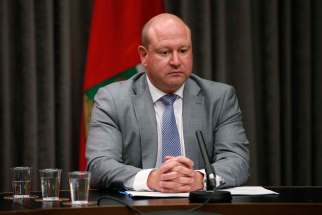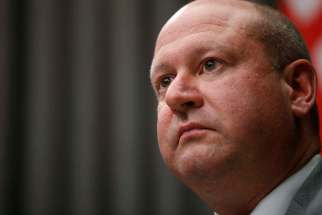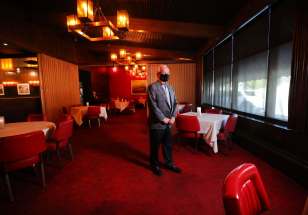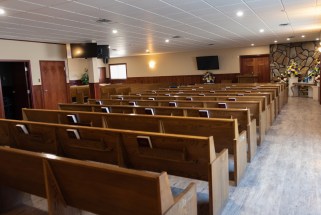Thin ice Minor hockey officials and hundreds of volunteers have logged big minutes on defence against COVID so kids can play; they hope new restrictions announced Friday calling a time-out are only temporary
Read this article for free:
or
Already have an account? Log in here »
To continue reading, please subscribe:
Monthly Digital Subscription
$0 for the first 4 weeks*
- Enjoy unlimited reading on winnipegfreepress.com
- Read the E-Edition, our digital replica newspaper
- Access News Break, our award-winning app
- Play interactive puzzles
*No charge for 4 weeks then price increases to the regular rate of $19.00 plus GST every four weeks. Offer available to new and qualified returning subscribers only. Cancel any time.
Monthly Digital Subscription
$4.75/week*
- Enjoy unlimited reading on winnipegfreepress.com
- Read the E-Edition, our digital replica newspaper
- Access News Break, our award-winning app
- Play interactive puzzles
*Billed as $19 plus GST every four weeks. Cancel any time.
To continue reading, please subscribe:
Add Free Press access to your Brandon Sun subscription for only an additional
$1 for the first 4 weeks*
*Your next subscription payment will increase by $1.00 and you will be charged $16.99 plus GST for four weeks. After four weeks, your payment will increase to $23.99 plus GST every four weeks.
Read unlimited articles for free today:
or
Already have an account? Log in here »
Hey there, time traveller!
This article was published 30/10/2020 (1865 days ago), so information in it may no longer be current.
You’ve likely heard the old saying that it takes a village to raise a child, which speaks to the importance of having an extensive network of community supports to prosper growth and development in a safe environment.
The same could also be said about raising a hockey player, especially these days
From parents and teammates, volunteer coaches and managers, referees and linesmen, rink attendants and Zamboni drivers, community club board members and league executives, there’s a seemingly endless list of people who make it possible to play the games we love.
Getting approximately 35,000 local skaters through camps and tryouts to an organized season is chaotic enough in the best of times. But this year, in the midst of a global pandemic and with COVID-19 infections still climbing, that village is being tested like never before.
“It’s been overwhelming, the preparations we’ve had to go through. Just from developing a return-to-play program, being able to properly communicate that to our members, and then ensuring compliance,” Peter Woods, the executive director of Hockey Manitoba, told the Free Press this week.
“It’s never-ending, because it’s fluid all the time. We’ve had to call a number of audibles.”

Another big one came Friday afternoon, when the province shifted Winnipeg to code red on the pandemic-response scale as a result of surging case numbers.
The new protocols, which begin Monday, include a minimum two-week suspension of all sports and recreational programs in the city — just as many were set to finally begin. The rest of the province is under a code orange, which would allow things to continue but with 25 per cent spectator capacity in rinks.
The hope, of course, is that this will be temporary, that numbers quickly get back under control and that all the hard work to this point doesn’t, ultimately, go to waste. Especially since there’s been no evidence to date of minor hockey playing a role in transmission of the virus.
“We’ve had tremendous support from the volunteers. They’re the backbone of the delivery of our program. They’re the front-line workers of our program. And we certainly applaud their efforts,” said Woods.
Today, we go behind the scenes to document some of those efforts, looking at how we’ve managed to get to this stage — and where we could be headed. It’s a story of dedication and perseverance, of setbacks and compromise, of frustration and flexibility.
● ● ●
Let’s tackle the question many people are likely asking. Why? Why is any of this necessary? Why put anyone at risk to play a silly game?
Shaun Chornley, who wears many hockey-related hats as the parent of an 11-year-old daughter who plays, as the president of the St. Boniface Minor Hockey Association and a board member with Hockey Winnipeg, sees the answer every day he’s at his full-time job as a member of the Winnipeg Police Service.
“I think it’s imperative for our children’s physical ability and for their mental health. I can tell you how tough it was on a lot of the kids when the hockey world was shut down in March. There were numerous teams deep deep deep into the playoffs, some about to play for championships. With hockey and sports, that’s an outlet for a lot of kids, a way for them to burn any undue stress,” said Chornley, now in his 23rd year on patrol in the city.
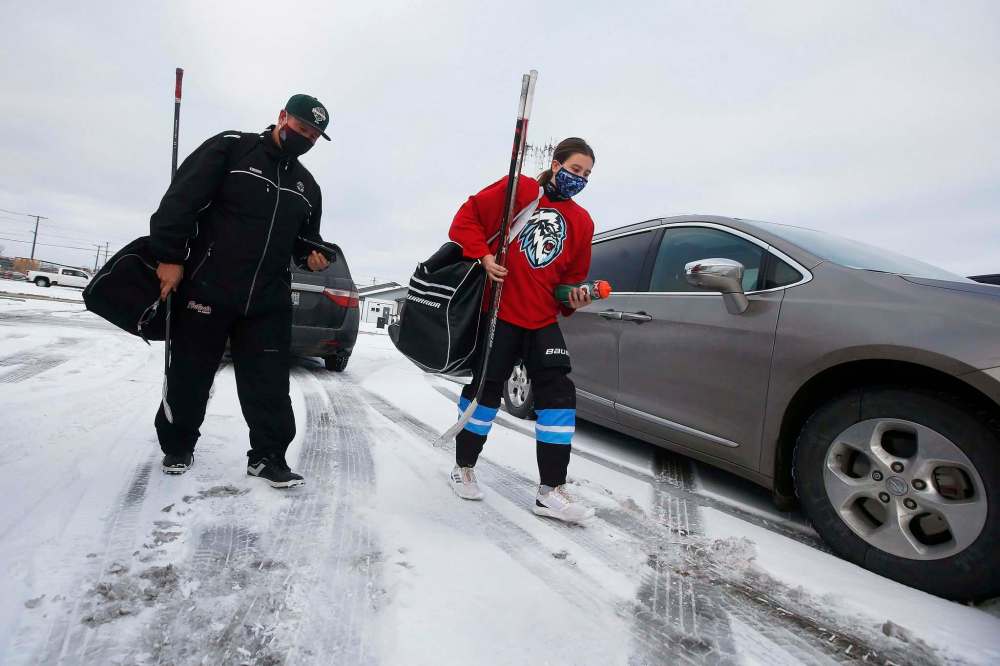
“Of course, it’s also imperative that kids feel safe when they come to the rink. We want them loving the game and having that sense of belonging.”
Chornley said the past few weeks have been especially stressful, as everyone learned to deal with the so-called “new normal” of minor hockey life, including the need for young players to arrive dressed to tryouts, practices and games, mandatory masks and social distancing where possible and capacity limits for spectators at rinks, which has posed the biggest challenge.
“People are struggling with understanding that. They just have to respect and understand that until things dissipate,” he said of the need to do plenty of pandemic-related policing at the rinks.
“Your head, at times, is essentially on a swivel,” he said. “But I have faith in our protocols that we’ve put in place within the arenas. And we’ve had people step up to attend the facilities on game days to help process the kids in. It’s been a challenge on many of our volunteers, but I have to say they’ve risen to the task.”
● ● ●
Talk about being thrown into the fire.
Jarred Dolyniuk picked a heck of a time to make his debut on the board of the River East Minor Hockey Association — as president, no less. Over the past six weeks, they’ve formed 90 teams of approximately 1,200 players at all levels.
And they did it despite being one of the highest-infected regions in the city, including a major outbreak at John Pritchard School that impacted several local skaters. Dolyniuk and his small army of volunteers have spent pretty much every evening and weekend at area rinks since early September.
“It has definitely been a challenge. It hit our area really quickly, and we had to change dates, bump dates back, we had to work COVID into tryouts. Our board has worked thousands of hours already just getting through tryouts. People are wearing all sorts of hats around the rink. It’s been pretty crazy,” he said.
That is especially true for the youngest players, the Timbits and novice skaters who still need help tying skates. With capacity limits inside rinks and dressing rooms, and just one parent per player allowed until at least Jan. 1, Dolyniuk has witnessed many examples of volunteers lending a helping hand.

Dolyniuk was bracing for a big reduction in registrations this year, but said their numbers are down less than 10 per cent overall from last season. The concerns about safely getting through the year remain ever-present, especially in the wake of Friday’s developments.
“It’s always on the back of our minds. Every day I’m getting emails from board members that are concerned about it. But as a parent, to be in the rink, to see the kids back to the way they were before this — they’re playing hockey, they’re having fun — for the kids, I think it’s so good for them to be out there,” he said.
Across the Chief Peguis Trail, Seven Oaks Minor Hockey just wrapped up final tryouts this week. President Kellen Jasper, a longtime parent, volunteer and board member, said it’s been “constant, on-the-fly adjusting.”
Similar to River East, the numbers are also down a tick, approximately 100 players in total — about 10 per cent. And it hasn’t been a smooth or quick process.
“When you look at the amount of hours we all put in, whether you’re at the rinks or behind the scenes, it’s amazing how our board have stuck together,” said Jasper. “The kids have been pretty amazing. The older they get, the more little reminders they need. But they know that our season depends on it.”
“The kids have been pretty amazing. The older they get, the more little reminders they need. But they know that our season depends on it.”
– Seven Oaks Minor Hockey President Kellen Jasper
The parents, unfortunately, haven’t always been so quick to adjust.
“Where we’ve had some issues is communication. We still have people showing up an hour early, and we’ve been firm on not allowing that, making them wait outside in the car,” said Jasper.
He’s also had to issue reminders about the importance of social distancing, including a strongly-worded “Notice of Spectator Expectations” now posted in area rinks which says, in part: “DO NOT STAND AROUND CHATTING IN THE LOBBY. You are there to watch the game/practice — not to socialize or congregate in groups in the lobby. You are either in the rink in your seat, in the washroom or in your car. There are NO OTHER OPTIONS.”
He concludes the missive with a reminder that “this is all about the children and the many benefits associated with them being active.”
Translation: Don’t be the village idiot who screws this all up.
“If we want to make this successful, we need to show the public, we need to show the health authorities, that we’re keeping everyone safe,” he said.
● ● ●
There’s no such thing as a typical game day anymore for Jim Berezowsky, the longtime head coach of the Winnipeg Thrashers U18 AAA team. As one of 13 teams scattered throughout the province, his league has been in a constant state of adjustment.
Take their game at Bell MTS Iceplex Wednesday night as an example. Rather than getting to the rink a couple of hours early to stretch, warm up and have individual player-coach meetings, everyone arrived approximately 30 minutes before puck-drop to avoid congestion.
Eight of his players got dressed in one room, another eight in a second, and four more in the hallway behind a curtain that was set up. After their 7-4 loss to the Wild, Berezowsky had no time to address his troops about the game. They had to bolt as quickly as possible, and the coach would have to save his comments for Zoom meetings he would do the next day, which included film breakdown.

“At this level we’re really engaged with our players, but we’ve kind of lost all of that, that ability to have that timely one-on-one. It’s forced us to look at the tools and technology that’s available today,” said Berezowsky.
For their home games at Gateway Recreation Centre, they’ve been limited to just 75 total spectators. That means restricting the visiting team to having only one representative per player. Two can come for the Thrashers, allowing a few extra spaces in the stands for scouts. All tickets are now being sold online.
Berezowsky said he finds himself speaking with players about health and safety protocols as much as he does about his special teams and defensive schemes.
“… I tell them, ‘Listen gentlemen, if we don’t follow the rules, we don’t get to play the game we love.’ Because they’re kids, they often think they’re invincible.”
– Jim Berezowsky, head coach of the Winnipeg Thrashers U18 AAA team
“We’ve had no COVID cases from our program at all. What it tells me is what we’re doing is the right thing, but these are young athletes, so you’ll always have to enforce communication and understanding. I tell them, ‘Listen gentlemen, if we don’t follow the rules, we don’t get to play the game we love.’ Because they’re kids, they often think they’re invincible,” he said.
Over in the Manitoba Major Junior Hockey League, Tim Scharer has added a long list of new duties to his role as president and general manager of the Charleswood Hawks. His typical day involves checking in with Hockey Manitoba, Manitoba Health and the City of Winnipeg for the latest information on numbers and protocols, which are ever-changing.
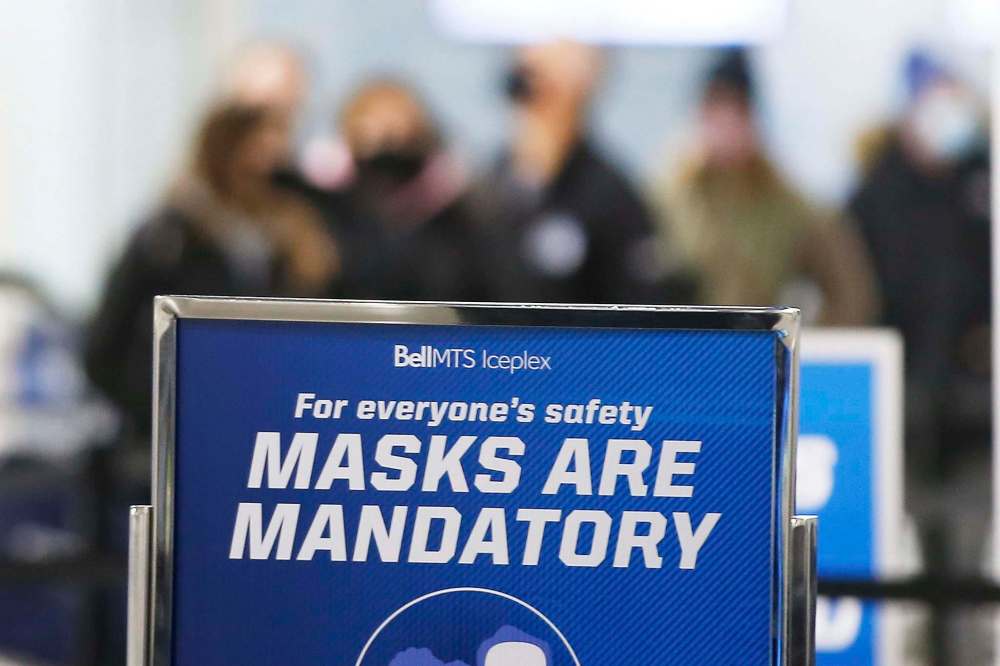
The team moved home games to the Iceplex this season to allow for more people to watch in person, while taking advantage of the facility’s streamlined screening process. An appointed communications officer then roams the facility during games to ensure compliance.
“We all really have a respect for being able to play the game. Outside of the rinks, our practices and our games, we can’t control our players. We can advise them to stick to a small bubble of friends. But hockey is a stress reliever, it helps your mental psyche. You get some physical exercise, you get some release. We say to them we don’t want to be the ones to blow it,” said Scharer.
Many rinks in Winnipeg are now equipped with “LiveBarn,” which allows family and friends to watch a game from the comfort of home. And technology is also being used for things such as Zoom parent meetings, replacing the traditional gatherings they have several times a year in a rented hall, or even at home games in a designated room where parents would take appetizers to munch on as their kids played on the ice below.
“I told them I take it one day at a time. In March we got the rug pulled out from under us, so you know you’re kind of living on borrowed time. Every game and practice I go to, I go and enjoy it. You have a greater sense of how fortunate we are,” said Scharer.
●●●
The 12-team Manitoba Junior Hockey League, with two city-based clubs, is going to have to make some further adjustments to an already altered schedule, which included a heavy emphasis on regional games.
Par for the course for commissioner Kevin Saurette.
“Nothing is normal this year, that’s the message we’ve been conveying. (Volunteers) don’t get enough credit. To be honest, without them there’s no hockey, really. The commitment they’ve undertaken to move forward, they’re to be commended. They’ve really bought in to what’s necessary. The day-to-day hockey-ops staff, they’re the real heroes in all this,” said Saurette.
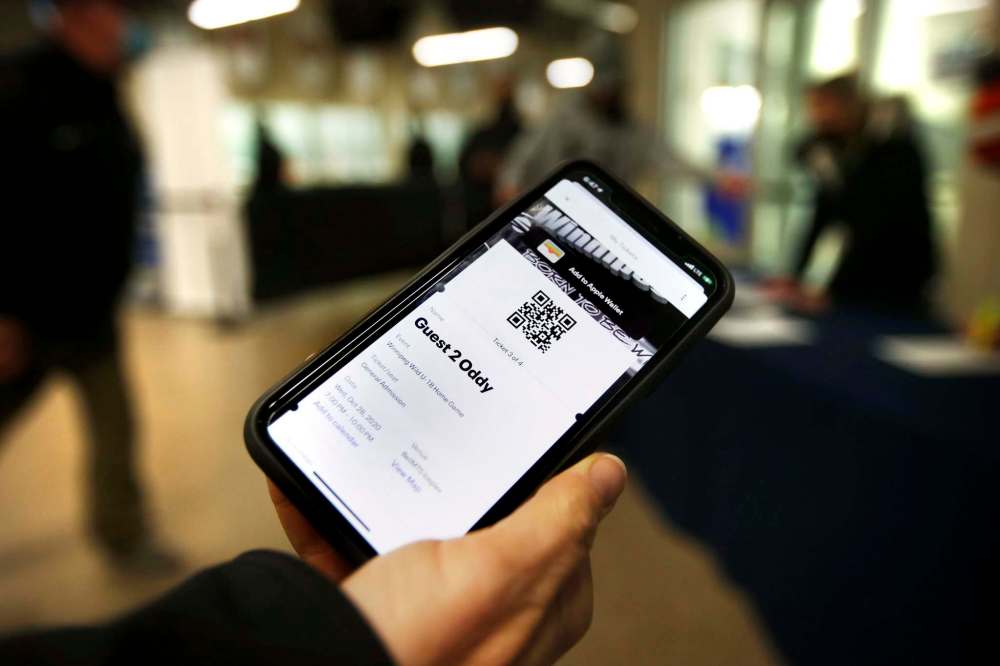
From building entrance and exit protocols, the flow of traffic inside a rink, seating arrangements, signage and sanitization, tracing and screening procedures and ticket sales, there are countless tasks to consider.
“The buy-in has been amazing. Everyone understands the privilege we have, being able to play hockey in this environment,” said Saurette. “I think, overall, the hockey community has taken a very responsible and structured approach just to start the season.
With families of out-of-town players, along with junior scouts, unable to attend in person, they’ve also seen a big jump in online viewership of their game broadcasts. Saurette has also paid an in-person visit to every team in the league to speak directly with players.
“You could see the joy in their faces to be given the opportunity to play, and they understand the responsibility that comes with it,” he said.
●●●
When we spoke with Woods prior to Friday’s announcement, he was already bracing for tighter restrictions, given the sorry state of numbers in the city.
“It would be irresponsible to not take those situations seriously. Something has to give,” he said.
And now that hockey in Winnipeg will go dark for at least a couple weeks, Woods offered up some sage advice that goes well beyond the rink.
“You can have somebody that is religiously following all the regulations, whether it’s our industry or another industry, and then everyone else will have to pay the price because of somebody else’s poor decisions,” he said.
“The indication we have is our membership has been doing an exceptional job, and there hasn’t been a spread internally. But if you have beer-league players not following the rules, it doesn’t matter what protocols you put in place,” said Woods.
“I understand there’s COVID fatigue, but we can’t take our foot off the gas, we can’t relax in this situation. It’s a collective responsibility. We need to be really cautious in how we’re going to approach it. We need to be a lot less selfish.”
mike.mcintyre@freepress.mb.ca
Twitter: @mikemcintyrewpg

Mike McIntyre grew up wanting to be a professional wrestler. But when that dream fizzled, he put all his brawn into becoming a professional writer.
Our newsroom depends on a growing audience of readers to power our journalism. If you are not a paid reader, please consider becoming a subscriber.
Our newsroom depends on its audience of readers to power our journalism. Thank you for your support.


